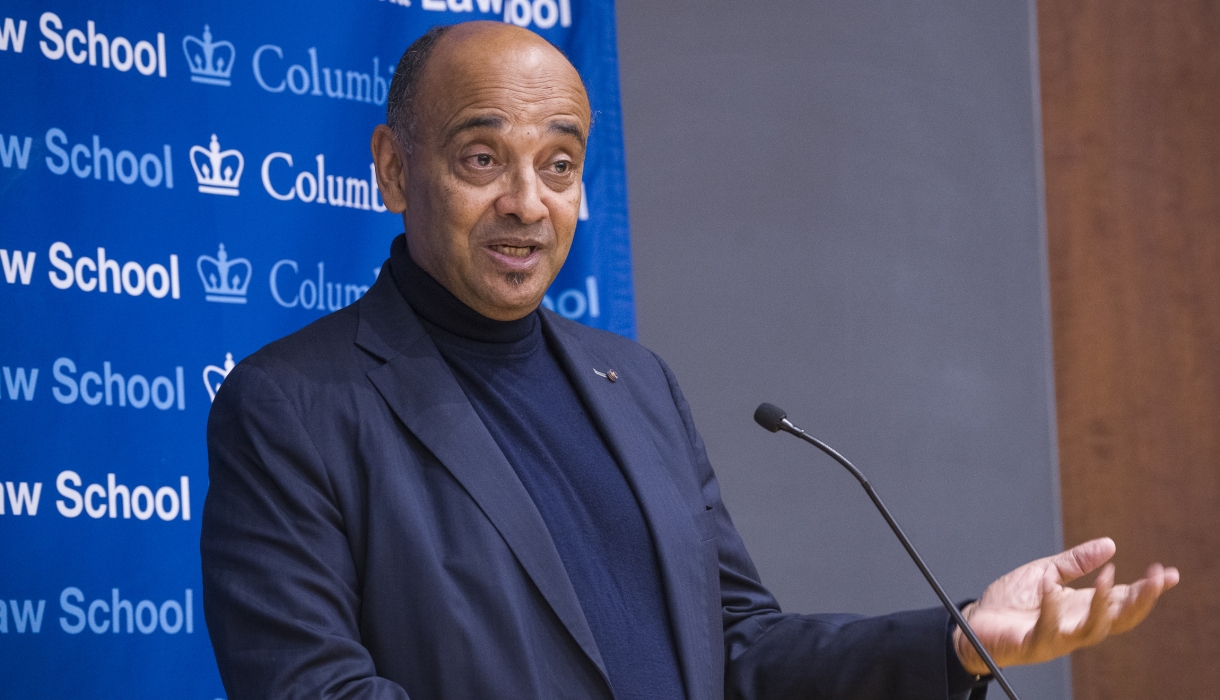2024 Ambedkar Law Lectures on Public Law and Political Thought
This year’s lectures examined the writings of Frantz Fanon, a leading theorist of race and revolution.

Pictured: Philosopher and writer Kwame Anthony Appiah delivering the 2024 Ambedkar Law Lectures at Columbia Law School in September.
The 2024 Ambedkar Law Lectures, named to honor a leading figure in the drafting of India’s Constitution, focused on Frantz Fanon, the revolutionary theorist whose works were seminal to African anticolonialism. The two lectures were delivered September 24 and 25 by Kwame Anthony Appiah, a writer and professor of philosophy and law at New York University, who explored Fanon’s theorizing of the relationship between violence and freedom through a study of Fanon’s two major works, Black Skin, White Masks and The Wretched of the Earth.
The 2024 installment of the recurring two-lecture series was organized by Mala Chatterjee, Associate Professor of Law, Jamal Greene, Dwight Professor of Law, and Madhav Khosla, Dr. B.R. Ambedkar Professor of Indian Constitutional Law.
Watch the 2024 Ambedkar Law Lectures: “Reading Fanon,” held on September 24 and September 25.
“Like the colonial experience and perhaps like violence, too, Fanon has become inescapable,” Khosla said in introducing Appiah’s lecture. “He is now, perhaps, as Auden once said of Freud, no longer a person, but ‘a whole climate of opinion.’”
Born in 1925 in Martinique, Fanon fought in World War II, then practiced psychiatry in a hospital in French-controlled Algeria while supporting the country’s war for independence. Black Skin, White Masks, his first book, was published in 1952.
Fanon’s preeminence as a revolutionary theorist is the reason to delve deeply into his work, Appiah said: “With canonical texts … what’s striking is how much we read into and also how much we read past.” Many commentators, Appiah said, “seem intent on deradicalizing him, or preserving his radicality merely as a matter of tone or decor.”
Fanon, in the end, Appiah observed, “is more instructive when we take him altogether, in all his contradictions, his penetrating insights, and his woeful misjudgments.”
Michele Moody-Adams (Columbia University), Aslı Ü. Bâli (Yale Law School), Kaiama L. Glover (Yale University), and Jeremy Kessler (Columbia Law School) each offered comments on the lectures. The comments reflected on Fanon’s views, how one might read him, and his contemporary relevance.
Delivered by prominent scholars of public law and other students of politics, the Ambedkar Law Lectures further understanding of justice, democracy, equality, development, and governance from historical, comparative, and philosophical perspectives. The series honors B.R. Ambedkar, an architect of the Indian Constitution, who received a Ph.D. at Columbia in 1927. It is supported by The Dr. B.R. Ambedkar Endowment at Columbia Law School.